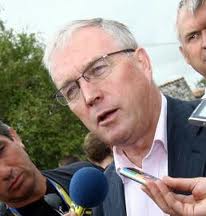It was a mixed weekend for the Belgians. First in tennis, Kim Clijsters won the Australian open and another Belgian An-Sophie Mestach won the juniors and is currently the world's number one. That was excellent news after the shock announcement that Justine Henin was calling it quits.
Kim's win made everyone hopeful that the men would sweep the cross championships. Expectations (and tensions) were high in a team with seven top riders. Although there had been some words, coach De Bie did what he could to calm the waters and on Saturday, all looked good for the day ahead.
Niels Albert was the clear favorite. The course suited the former world champion and he has been on a winning streak throughout the season. But Niels had a bad day and some bad luck and he was out before the racing started. He ended in 24th, a world away from the winners and appeared to have fallen off the planet as far as the Belgian media was concerned.
Niels' problems left Stybar, who will ride for Quick-step next season and Sven Nys alone to battle it out. Although Nys fought hard, he could not stop Stybar from riding away from him with four laps to go. Behind the leaders Pauwels fought French and German riders for third. The podium was Stybar, Nys and Pauwels. A Belgian victory of sorts, as Stybar lives in Belgium, speaks Dutch, and rides for a Belgian team. He is an adopted (Flandrien) Belgian.
An estimated 1.2 million Belgians watched the event on TV. Pretty good for a sport that is decidedly not tops during soccer season.
 |
| Stybar, Nys and Pauwels |
This weekend's results and news coverage highlight another Belgian idiosyncrasy: despite being a cycle-crazy country, there is very little interest in women's cycling in Belgium. Although nearly all girls and many women ride bikes in Belgium, cycling is not traditionally seen as a desirable sport for women. Belgians may not want to admit it, but the feeling runs quite deep in some areas and it is only recently that women's cycling has received a little bit of attention. I am willing to bet that most Belgian cyclocross fans could not name one woman on the Belgian team.
 |
| Kim Clijsters down under |
Women's cycling races have (relatively) few competitors, a very sparse race calendar (by Belgian standards) and hardly any news coverage. That is true for all five cycling disciplines. Somewhat ironically, women's cycling is (relatively) popular in countries such as Britain and the US, where men's cycling is a minor sport.
Tennis on the other hand, is a very popular sport for Belgian women. And that is not just because Belgium had some success there in the past. As a matter of fact, it is precisely because tennis is so desirable and popular among girls that Belgium has these tremendous successes. Women's tennis is one of the few women's sports that gets top billing -on par with men's sports- in Belgium. It is also a sport where Belgium has a deep line-up of top players, which is all the more amazing given how small the country is.
In other news, Spanish rider David Etxebarria has made some waves by lashing out at former team mate Alberto Contador. Etxebarria is accusing Contador of being hypocritical and remaining silent when others were accused of doping. He twittered, "Don't shout out when previously you stayed silent." Etxebarria was a team mate of Contador in 2005 and 2006 at Liberty Seguros. Clearly there is some bad blood here.
And finally, I was able to sleep on left shoulder for the first time since my crash on December 8. I did not follow the advice of my orthopedist (to inject cortisone) but rather opted to leave things alone. The shoulder still hurts a bit from time to time, but overall it is healing well and I am hopeful that it will continue to do so.















































